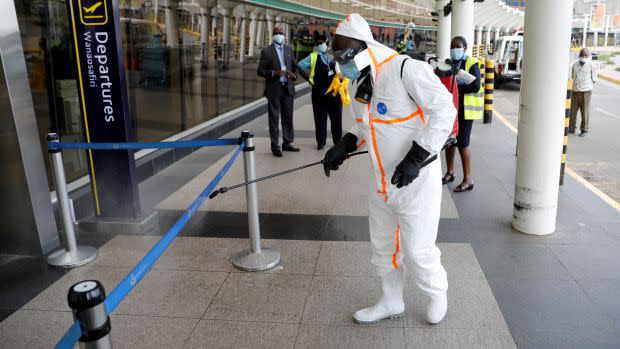Africa’s Covid-19 passport lays the groundwork for controlling future disease outbreaks

Despite being created to manage travel during the Covid-19 pandemic, the African Union’s Covid-19 passport can set in place a mechanism for controlling future pandemics and disease outbreaks in the continent.
Launched in October 2020 by the African Union Secretariat and the Africa CDC, the passport program, dubbed Trusted Travel, supports member states in verification of Covid-19 test certificates and harmonization of entry and exit screening. It provides travel requirement information at exit and entry ports plus a list of government-approved laboratories for Covid-19 testing. In addition, it enables travelers to upload their Covid-19 test results online for verification by health and travel officials.
“It works to remove gaps that can be exploited by unscrupulous elements in society to evade sensible public health measures with fake health documents,” Nicaise Ndembi, chief science officer at the Africa CDC, the AU’s health agency, told Quartz in an email.
So far, Trust Travel has digitized lab registries in 35 of the 55 AU member states and about 16 countries have adopted it.
The AU’s Covid-19 infrastructure can help manage future pandemics
Beyond Covid-19, such infrastructure could be useful in setting up a system to manage future pandemics and disease outbreaks in Africa. As an example, as Covid-19 was slowly spreading throughout the continent in March 2020, Nigeria was battling a Lassa fever outbreak that was deadlier than Covid-19.
There’s high risk of cross-border infection in Africa due to porous borders. With Ebola, there have been reports of cross-border spread of the disease through movement between Uganda and the Democratic Republic of Congo.
Fake medical documentations are another threat, with the reported thriving black market for fake immunization certificates and fake yellow fever vaccination certificates in different countries.
Countries in the continent have individual measures to prevent the spread of diseases into their borders, but this can be strengthened with intergovernmental coordination.
A few countries on the continent already have ongoing efforts to establish and operationalize emergency operations centers (EOCs) that became especially valuable after the 2014-2016 west Africa Ebola crisis. The AU and Africa CDC’s efforts are a much needed collaborative effort especially as we move to an Africa with fewer travel restrictions under the African Continental Free Trade Area.
Trusted Travel is part of a larger plan dubbed 4D by the AU, the private sector, and civil society to control future pandemics and the spread of future disease outbreaks in the continent, says Mohammed Abdulaziz, the Africa CDC’s head of disease surveillance.
One component is “bringing multiple sources of data together to help African policymakers predict dangerous trends in disease transmission before outbreaks occur,” he says.
Sign up to the Quartz Africa Weekly Brief here for news and analysis on African business, tech, and innovation in your inbox.
Sign up for the Quartz Daily Brief, our free daily newsletter with the world’s most important and interesting news.
More stories from Quartz:
These companies still donate to Jan. 6 seditionists in Congress
Will sending its largest-ever contingent change India’s fortunes at the Olympics?
